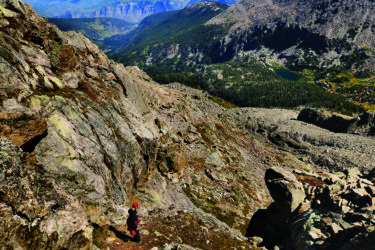The Local newsletter is your free, daily guide to life in Colorado. For locals, by locals.
In a given year, roughly 20 to 25 percent of people who ski in the United States do so in Colorado. Keeping them all safe in the midst of a global pandemic is no small task, even though much of the skiing experience takes place outdoors in wide-open, ostensibly less-virus-saturated spaces. Resorts have had to make changes, both minor and major, to tamp down the spread of infection. But while new requirements—like lift ticket reservations and face mask mandates—may feel cumbersome, plenty of other shifts actually could help streamline (read: improve!) our days on the slopes. “As weird as it sounds,” says Loryn Duke, director of communications for Steamboat Ski & Resort Corporation, “one of the silver linings to COVID is that it has made us take a step back and see opportunities for the future for changing the way we do business.” The following pandemic-inspired protocols may well live on for powder runs in the years to come.
Elevated Tech
COVID-19 has drop-kicked the ski industry into the digital age with both large and small resorts taking steps to implement “touchless transactions.” Places like Aspen Snowmass, Powderhorn Mountain Resort, and Purgatory Resort have adopted new purchase processes through their apps and websites to create a one-stop shop for buying lift tickets, reserving lessons, and/or expediting gear rentals. Arapahoe Basin Ski & Snowboard Area has incorporated “skiosks” where guests can print out their pre-purchased lift ticket, much like we do at the airport. Meanwhile, Vail Resorts has added interactive trail maps to its EpicMix app in part to help prevent guests from congregating at the top of a lift to review the trail signs. “We’re excited about these technological changes in large part because they will live on into the future,” says Will Shoemaker, senior communications specialist for Crested Butte Mountain Resort and representative for Vail Resorts.


Faster Food, Fewer Interactions
In contrast to the cafeteria-style melee that was once the norm in a base area ski lodge at lunch time, this year grab-and-go will be the gold standard. Resorts across the state are adding food trucks, trailers, and other order-at-the-window-esque options to reduce guests’ time inside damp, crowded, and icky-surface-ridden dining halls. “Pandemic or not,” says Sam Bass, Eldora Mountain Resort’s director of marketing, “grab-and-go food options are convenient.”

There’s also a widespread trend toward providing spaces to eat en plein air, both on-mountain and down in the base areas. From Copper Mountain to Vail to Steamboat, tents and heaters will help guests warm up while remaining outdoors—or, at least, quasi-outdoors. Mountain Village, located at the base of Telluride Ski Resort, has cooked up some especially noteworthy plans for safer dining. The town will station 20 refurbished gondola cabins throughout its three plaza areas. Each will be sanitized between user groups and limited to eight or fewer guests from one party. “These gondolas will be a safe place for folks to enjoy food and drink this winter and beyond,” says Kathrine Warren, public information officer for the Town of Mountain Village.
Smaller Class Sizes
Statewide mandates limiting group sizes extend to the bunny hill. But with the student-to-instructor ratio decreased this year, participants are in what Eldora’s Bass calls “a more personalized learning environment.” Translation: An instructor stands right next to Little Suzie when teaching her to wedge rather than barking orders across the whines of 11 other kids. As for pricing? Resort officials are still ironing out specifics, but if rates stay similar to last year’s, students will get a near-private lesson for the price of a group tutorial.
While officials can’t say for sure that reduced class sizes will live on after a vaccine saves us from ourselves, other innovations, like Arapahoe Basin’s new-this-year, three-pack of private lessons, are expected to have a post-pandemic shelf life. “Everything new is being done for health and safety reasons,” says Katherine Fuller, A-Basin’s communications manager, “but some really cool new ideas have come out of it.”
Keeping It Clean
The past 10 months have vaulted all of us to new stratospheric levels of germophobia—necessarily. That obsessive-compulsive need to wash your hands will be supported by Colorado’s ski resorts, which plan to sanitize gondola cabins much more frequently, resnake lift lines to ensure guests stay at least six feet apart from those outside their parties, and situate bottles of hand sanitizer almost everywhere there’s point-to-point contact between people. These heightened standards of cleanliness are here to stay, says Liz Rovira, communications manager for Aspen Skiing Company: “We’ll always go above and beyond with sanitation standards from here on out,” she says. Given that runny noses have always been commonplace on ski runs, that’s a welcome change.








